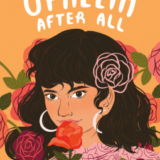Violeta: A Review By: Paloma Lenz


In Isabel Allende’s latest novel, Violeta, its title character Violeta Del Valle recounts pivotal moments in her life throughout the 20th century through letters to her grandson in her final days.
Violeta was born the youngest of six, preceded by five brothers, during the Spanish Flu pandemic in 1920 in South America. She is the daughter of an ambitious and slightly greedy businessman who eventually loses the family’s fortune during the Great Depression. Ultimately, the Del Valle’s are eventually forced to give up their extravagant and comfortable city life to seek refuge on a rural farm in their unnamed South American country.
Violeta’s life happens during the social and political upheaval throughout the twentieth century. She tells her story to her grandson, Camilo, whom she raised after her daughter Nieves dies during childbirth.
Though the family’s rural setting kept them mostly isolated from the direct effects of the fight against fascism in Europe during World War II, Allende uses her extensive historical research to embed the after-effects of the war into Violeta’s story. For instance, in her rural South American community, there is a German expatriate community wherein a German family runs a successful bed and breakfast called Hotel Bavaria adjacent to an indigenous community. Violeta enters into a failed marriage with a member of this expatriate community before being swept away by the eventual father of her two children, Julian Bravo.
Julian is a playboy jetsetter whose life is fueled by adventure and sex, and Violeta finds herself hopelessly enraptured. She leaves her first husband to the dismay and shame of both their families and soon finds herself pregnant with a daughter and then a son. Julian is vocal about his disinterest in children and marriage. Luckily, Violeta is in business with one of her brothers, Jose Antonio, and can financially provide for herself. She also manages Julian’s books and covers for some of his more nefarious undertakings as a pilot, moving people under the guise of the night from South America to Miami, Florida in the 1950s.
But Violeta’s life is constantly plagued by uncertainty. Her relationship with Julian and the socio-political forces that led to upheaval in the southern cone of South America from the late 1960s into the 1980s weigh heavily on her. One of the most compelling features of this book is how Allende interweaves historical facts presented through the perspective of a fictional character. Not many readers may be familiar with Operation Condor, an effort by the U.S. to back military dictatorships which led to the kidnapping, rape, torture, and murder of political opponents. In the book, Violeta’s son, Juan Martin, was involved in the resistance forces leading up to the political upheaval and managed to escape torture and death with the help of a family friend. Juan eventually runs to Norway and finds refuge among a community of Latin American asylum-seekers in Oslo, an interesting juxtaposition from the German expatriate community of the 1950s in his home country.
Violeta’s life spans 100 years and ends with her alone in her final days in the rural property of her youth. It is 2020, and the coronavirus is spreading westward from Asia and the world is shut down. She is isolated in her final days and uses this time to recount her life story to Camilo before she meets her ancestors on the Other Side.
Overall, Allende’s novel is a gripping tale of one woman’s extraordinary life and is highly recommended.




Comments
Trackbacks & Pingbacks
[…] Violeta by Isabel Allende […]
[…] September is the gateway to fall weather, which means curling up with a good book and maybe a warm drink. No matter where you are, we hope you’ll find yourself in a cozy spot with these new September book releases! […]
[…] family lives in a small Florida town known for its Mermaid Cove. Here, skilled swimmers dance for audiences underwater, enticing […]
[…] History shows that when the Europeans invaded our lands, they made a point to try to remove our Indigenous roots. They did so by taking our ancestors’ land, culture, language, and sense of self. This […]
[…] Beatriz discovers quickly that the hacienda is not the sanctuary she hoped for. Instead, she feels the house in her bones: the cold that seeps […]